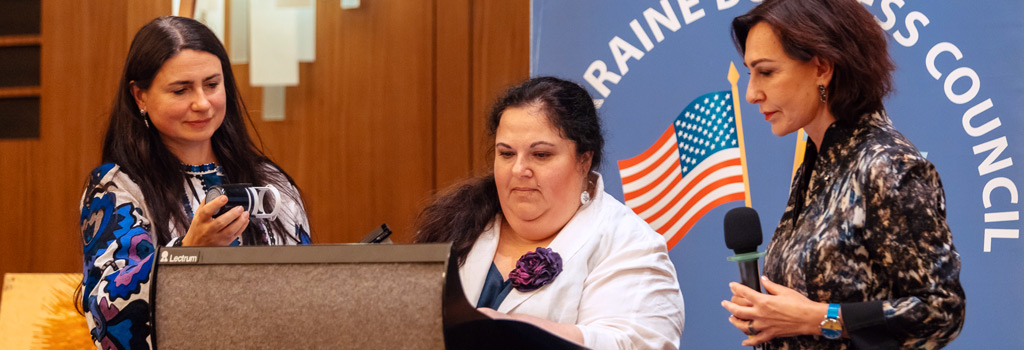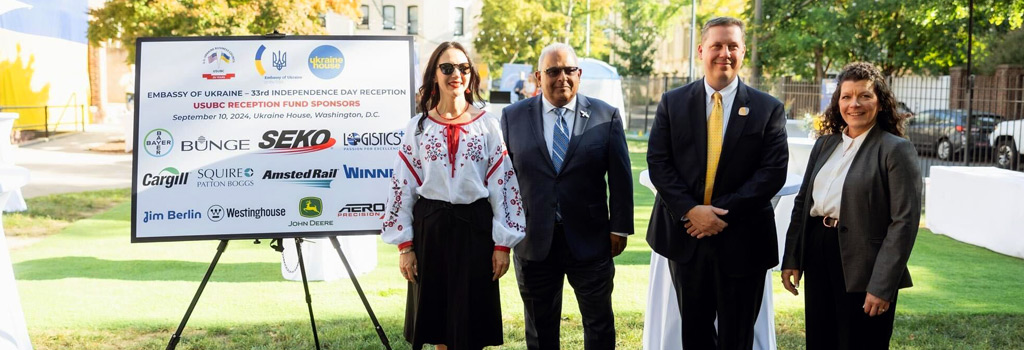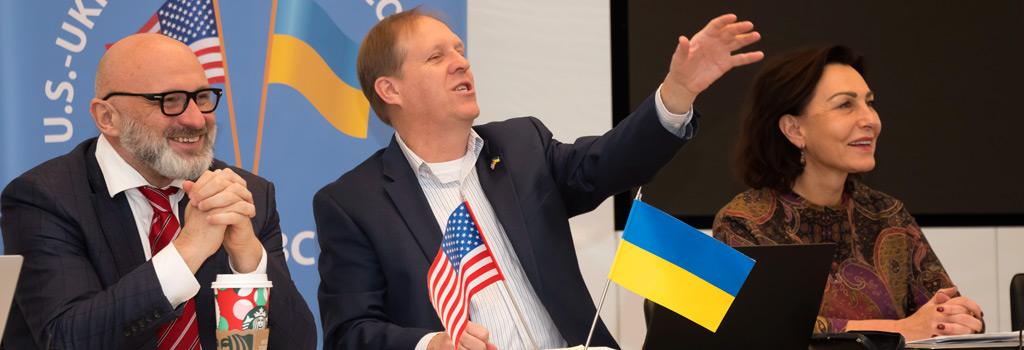Featured Galleries USUBC COLLECTION OF OVER 160 UKRAINE HISTORIC NEWS PHOTOGRAPHS 1918-1997
 Holodomor Posters
Holodomor Posters

WHAT HAS THE ECONOMIC CRISIS MEANT FOR UKRAINE?
 Analysis & Commentary: By Ildar Gazizullin, Senior Economist
Analysis & Commentary: By Ildar Gazizullin, Senior Economist
International Centre for Policy Studies (ICPS) Newsletter #2 (465)
Kyiv, Ukraine, Monday, 25 January 2010
WHAT HAS THE ECONOMIC CRISIS MEANT FOR UKRAINE?
Analysis & Commentary: By Ildar Gazizullin, Senior Economist
International Centre for Policy Studies (ICPS) Newsletter #2 (465)
Kyiv, Ukraine, Monday, 25 January 2010
KYIV - Ukraine’s economy is slowly recovering after a financial crisis that peaked in 2008. Still, many sectors are unlikely to see output and profits return to pre-crisis levels any time soon. The new President will have to take a series of unpopular steps to prevent a catastrophe with the State Budget. ICPS Senior Economist Ildar Gazizullin writes about this and about the prospects of further economic growth.
THE MACROECONOMIC PICTURE
Most sectors of Ukraine’s economy saw production fall even further during 2009. The one pleasant surprise was the farm sector, which came out even after a high baseline from last year, poor weather conditions and limited credit.
Still and all, the depth of the economic downturn has been slowly lessening since Q2’09, mostly because of rising world demand and higher prices for many of Ukraine’s export commodities. Ukraine’s economic recovery will continue into 2010. The ICPS forecast is for GDP growth to rise to 4%. In 2011 and 2012, the pace of growth should pick up to 5% and 6.7%.
Those sectors oriented on consumer products are seeing output rise slowly, as the level of consumption is not moving up especially quickly. In 2010, wages will grow modestly as business demand for labor will be low with the continuing high level of uncertainty in the economy. Lack of access to credit and lack of confidence among consumers regarding their financial futures will also make it hard for demand to leap forward.
Recovery will also be difficult in those sectors that depend on domestic investment demand. ICPS analysts expect such demand to remain weak in 2010, leaving the situation in construction and machine-building slow. Noticeable improvement will only be felt in 2011.
In addition, economic growth could prove unsustainable. The risk of a second wave of crisis remains. This could be caused by a rally on world stock and commodity markets that is not supported by the fundamentals and would lead to a further reduction in capital investment plans for 2010. This cause demand for steel, fertilizer and machinery, which are Ukraine’s main export commodities, to decline again.
One internal factor that creates risk is a soft Budget policy that, together with a rise in regulated prices for utilities and residential services after the election, could launch an inflationary spiral.
WHAT ABOUT REFORM?
The Ukrainian Government’s anti-crisis measures during 2009 were largely ineffective, similar to many other governments, and had little serious impact on the economy. For instance, efforts to improve the regulatory environment - which, as a rule, does not require much in the way of Budget spending - failed: most of the related bills did not pass in the legislature. Ukraine was once again unable to raise its low rating significantly in the World Bank’s annual survey called Doing Business.
State assistance continues to be improperly directed and poorly administrated. Thus, instead of supporting projects that might spur growth across the economy, such as energy efficiency programs, the Government decided to provide assistance to selected sectors.
When the situation on external markets was extremely bad, the Government offered breaks to the steel and chemicals industries in the form of reduced rates for gas and electricity. However, it did not withdraw these benefits even when the situation on foreign markets improved markedly.
Until now, reforms have been largely urged on Ukraine by international financial institutions. Starting in 2000 and throughout the period of strong economic growth, not one Government felt enough incentive to undertake much-needed changes. In 2009, the International Monetary Fund was unable - or did not wish to - persuade the Government for the umpteenth time to start these reforms but simply withdrew its credit.
RISK GOVERNMENT AND RADA WILL CONTINUE TO DO NOTHING
This means there is a risk that the Government and Verkhovna Rada will continue to do nothing, not only in the first quarter, but possibly throughout the first half of 2010 because of the high probability that another snap VR election will be called for Fall 2010.
Still, even if the new Administration hits the ground running with transformations, it will be unable to resolve the accumulated structural problems in the economy very quickly. This includes pension reform, which, like other reforms in the social sector, by its nature is a longterm process that can take as much as a decade to complete.
Meanwhile, raising residential gas prices, as is expected in 2010, will not be the magic wand to fix the problems of utility companies because it will not bring enough of an inflow of cash to cover Naftogaz Ukrainy’s debts. Moreover, there have been no real transformations in Ukraine for some time now, which might have not only led to the passing of individual laws but also to the modernization of existing institutions or the establishment of new ones.
It is these institutions and not outdated fixed assets or the lower numbers or poorer quality of the labor force that are the weakest point in Ukraine’s economy today. In the end, their inadequateness makes the entire economy vulnerable to external shocks and limits its potential for growth.
NOTE: For additional information, contact ICPS senior economist Ildar Gazizullin by phone at (+38044) 484-4400 or via e-mail at ig@icps.kiev.ua.
The ICPS Newsletter is a bi-weekly publication of the International Centre for Policy Studies, delivered by electronic mail. To be included in the distribution list, mail your request to: marketing@icps.kiev.ua. ICPS Newsletter editor: Olga Lvova (olvova@icps.kiev.ua), Phone: (38044) 484-4400. Fax: (38044) 484-4402. English text editor: L.A. Wolanskyj.
The International Centre for Policy Studies (ICPS) is a leading independent think-tank in Ukraine. ICPS was established at the initiative of the Open Society Institute in 1994. ICPS’s mission is to support the further democratization and modernization of Ukraine through proactive, consistent Europeanization.
Address: vul. Pymonenka 13A, Kyiv, Ukraine 04050, Web-site: http://www.icps.com.ua/eng/.

















